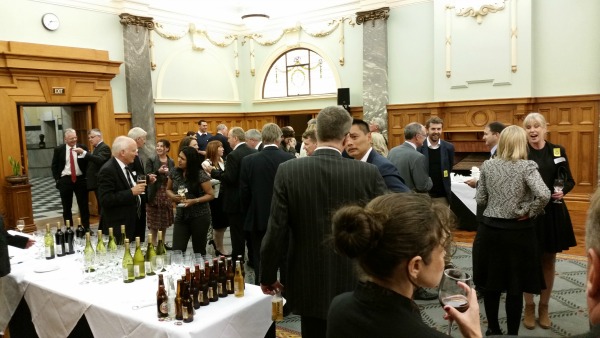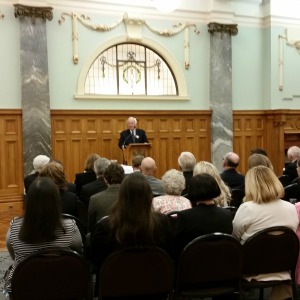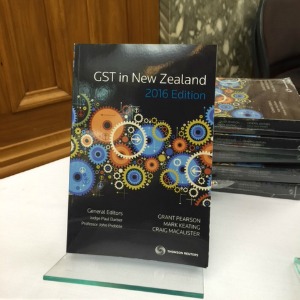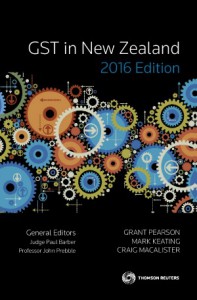Launching the book GST in New Zealand
In 1986 Sir Roger Douglas, then Finance Minister, launched the Goods and Services Tax (GST) in New Zealand.
In 2016 he was back in Parliament as a guest of honour along with fellow “tax” luminaries for the launch of GST in New Zealand, a new text providing in-depth commentary and practical advice on the application of the law.
On 7th April seventy-five people gathered in the Grand Hall to mix, to mingle and to hear from guest speakers as well as those directly involved with the book.

The event was officially opened by Thomson Reuters ANZ General Manager of Tax and Accounting Ben Scull who affirmed that the company was committed to producing a whole library of tax commentary of similar calibre. GST in New Zealand, he said, was the start of more to come
Professor John Prebble MC
Ben handed over to Professor John Prebble, one of the book’s two General Editors, and MC for the evening.
Judge Paul Barber retires
Professor Prebble began by announcing the retirement of Judge Paul Barber, his fellow General Editor. He acknowledged and thanked him for his support, insight and sustained effort not only with this book, but with the entire tax commentary project.
He recalled how they both hatched the plan together, how they approached Thomson Reuters NZ as a possible publisher with great trepidation and how surprised and delighted they were when their plan was accepted. It was, he said, an ongoing ambitious and lengthy project.
1986 - lessons from literature
What is literature? Could it be an adult magazine?
[caption id="attachment_8060" align="alignright" width="300"] Sir Roger Douglas[/caption]
Sir Roger Douglas[/caption]
In talking about the launch of GST in 1986 Sir Roger Douglas recalled the “literature” debate.
Booksellers, educational institutions, librarians – people with a vested interest in protecting open access to the printed word, gathered together to protest the inclusion of literature as a taxable product. The challenge, he said, lay in establishing what “literature” was. Could it be an adult magazine as well as any work deemed worthy of the title by those protesting? After all both were printed! What separated them was a matter of individual perspective. It was, as he said then, and in retelling the anecdote, a conundrum for which there is no logical answer possible.
The only solution to prevent GST from becoming mired in complicated exemptions, such as making distinctions based on a definition of literature, was to keep it broad based with as few as possible. In turn that would make it simple to implement and cost effective.
Many countries, particularly Australia, he said were envious of what New Zealand had achieved and the system had been replicated by others.
GST is the combine harvester of government revenue
The Hon. Paul Goldsmith, co-host with Thomson Reuters for the event, and author of “We Won, You Lost, Eat That!: A Political History of Tax in New Zealand Since 1840” commented that GST was the “combine harvester” of government revenue. It steadily and reliably went to work ensuring the stability and continuity of core government functions.
The authors
 The book’s three authors all spoke. Grant Pearson, its principal writer, shared how it was Judge Barber who had talked him into taking on the project which had in turn taken over his life for more than twelve months.
The book’s three authors all spoke. Grant Pearson, its principal writer, shared how it was Judge Barber who had talked him into taking on the project which had in turn taken over his life for more than twelve months.
Like Roger Douglas before him, he touched on the need for GST to remain broad based. It was hard he said to exempt specific items without becoming embroiled in debate about minutiae. For example, when is a biscuit a luxury item? Is it when it is dipped in chocolate? If it’s half-dipped, is it still a luxury item?
Craig Macalister who was brought in to share his practical experience and expertise spoke about the vision growing as they realised the sheer quantity of commentary they needed to add to ensure the book had the authority and depth they’d envisaged from the outset. That led to inviting Mark Keating who spoke about how proud he was to have the opportunity to take part in the project.
After the official speeches guests lingered to chat, to catch up with one another while enjoying a glass of wine or a beer with their peers.
Finally ...
Thank you to all of you who were able to come along.
Thank you in particular to Sir Roger Douglas, Hon Paul Goldsmith – our official host of the evening, Professor John Prebble, Don Brash, Judge Paul Barber who was accompanied by his daughter Nerissa Barber, and John Shewan - who contributed the Foreword for the book.
 For more information -
For more information -
Please click GST in New Zealand.
The text is available in varying formats: a book, an ebook or online through Westlaw NZ or Checkpoint.